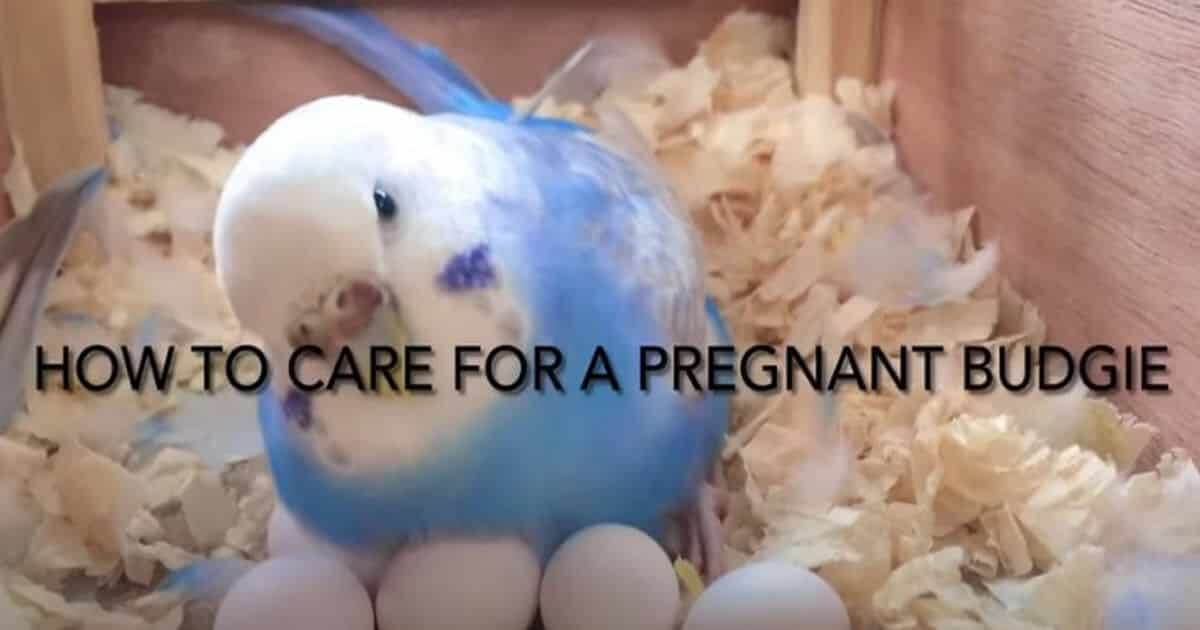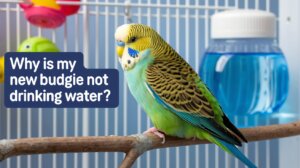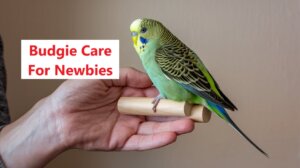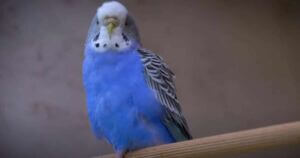How To Take Care Of Pregnant Budgie? Essential Insights
Taking care of a pregnant budgie, or a budgie preparing to lay eggs, requires special attention and care to ensure the health and well-being of both the mother and her future chicks. So, knowing how to take care of pregnant budgie is crucial.
Caring for a pregnant budgie involves creating a comfortable nesting environment, offering a nutritious and well-balanced diet rich in calcium and other essential nutrients, and ensuring a calm, stress-free atmosphere in their habitat. Maintaining a clean cage and providing ample space for the budgie to move around is also essential.
However, this article shares the most vital caring steps for a pregnant budgie. These steps will help ensure a successful and healthy breeding experience for your pregnant budgie.
How To Take Care Of Pregnant Budgie?

To take care of a pregnant budgie, remove any eggs that she lays and dispose of them, as she won’t want to sit on them. Provide a balanced diet with fresh fruits and vegetables, ensuring she has access to clean, fresh water.
Avoid disturbing her during breeding, as she may exhibit aggressive behaviour.
However, taking care of a pregnant budgie requires special attention to ensure the mother’s and her eggs’ health and well-being.
Here are some essential tips to follow:
1. Provide A Proper Diet
You should provide your budgie with a balanced diet that includes high-quality pellets formulated explicitly for budgies and fresh fruits and vegetables. Ensure to incorporate leafy greens and a selection of fruits to guarantee a diverse range of nutrients.
Additionally, when your budgie has a nest box and is in the breeding phase, it’s beneficial to offer egg food, which is cooked egg mixed with crushed eggshell, to support their nutritional needs during this crucial period.
2. Maintain A Comfortable Environment
For your budgie, who will be laying eggs, you should set up a spacious and secure cage that allows her ample space to move around comfortably. Place a nest box inside the cage to offer her a safe and cozy environment for laying her eggs.
Also, it’s essential to ensure that the cage is situated in a calm area of your home, away from loud noises and disturbances, to provide a peaceful environment for your budgie during this important time.
3. Monitor Her Health
It’s essential to monitor your budgie for any signs of illness regularly. Watch for changes in appetite, breathing difficulties, or any abnormal behaviour.
If you observe any symptoms that concern you, it’s crucial to consult with an avian veterinarian promptly. They can provide a thorough examination and offer the appropriate advice to ensure the health and well-being of your budgie.
4. Watch For Signs Of Pregnancy

You can look for physical signs of pregnancy, such as a swollen abdomen and changes in behaviour. Pregnant budgies may display nesting behaviour, such as picking up material and rearranging it in the cage.
5. Provide Adequate Calcium
You should provide a calcium supplement for your budgie, such as a cuttlebone or a calcium block, to support healthy egg production.
Calcium plays a vital role in developing strong eggshells and helps prevent calcium deficiency in the mother.
However, this is especially important during the egg-laying period to ensure both the eggs’ health and the mother budgie’s well-being.
6. Allow Sufficient Rest
Limiting handling and interactions with your budgie as she approaches the egg-laying stage is advisable.
Especially during the latter part of this period, reduced handling can help her feel more secure and less stressed.
Aim to create a calm and quiet environment in your home to minimize any stress factors.
However, this peaceful atmosphere will promote restful periods for the mother, which is crucial for her health and well-being during this sensitive time.
7. Regularly Clean The Cage
Maintaining cleanliness and hygiene in your budgie’s cage is crucial to prevent the spread of bacteria and diseases. Ensure you remove soiled bedding, waste, and any uneaten food daily.
However, this regular cleaning helps to keep the environment sanitary. Additionally, it’s important to disinfect the cage and all accessories periodically.
Doing so will help to maintain a healthy and safe environment for your budgie, which is especially important during the egg-laying and hatching period.
8. Observe Egg-laying Process

Monitor the budgie closely during the egg-laying process and ensure she is comfortable in the nest box.
If the budgie has difficulty laying an egg or shows signs of distress, seek immediate veterinary assistance.
9. Remove Unfertilized Or Abandoned Eggs:
Removing them from the cage is best if the budgie lays unfertilized or abandoned eggs.
The mother will not miss them, and it will prevent any potential health issues.
Seek Professional Advice:
If you have any concerns or questions about the care of your pregnant budgie, consult a reputable avian veterinarian for guidance.
Following these guidelines and providing proper care can ensure your budgie’s comfortable and healthy pregnancy. Remember that each budgie is unique, so observing their behaviour and adjusting their care is essential.
Diet For Budgies Pregnancy- What Food Is Good For Pregnant Budgies?
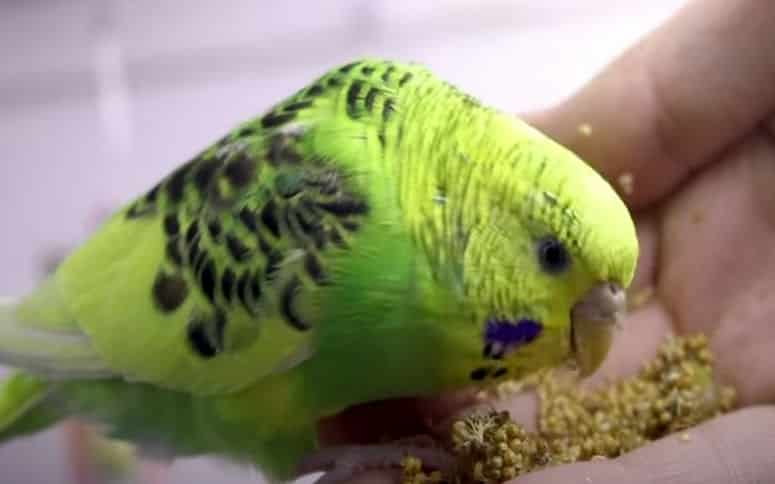
During a budgie’s pregnancy, providing a nutritious diet is crucial for both the mother bird and her developing babies.
Here are some key points to remember when it comes to the diet of pregnant budgies:
Seeds
High-quality budgie seed mix should form the foundation of your pregnant budgie’s diet. Look for a mix that includes a variety of seeds, such as millet, canary grass seeds, and hemp seeds. These will provide essential nutrients and energy for the expectant mother.
Pellets
Pellets can be included in the budgie’s diet as a supplemental food. They are formulated to provide a balanced diet and contain essential vitamins and minerals. Always choose pellets designed explicitly for budgies.
Fresh Fruits And Vegetables
Pregnant budgies can benefit from a wide range of fresh fruits and vegetables. These provide essential vitamins, minerals, and fibre.
Offer carrots, broccoli, spinach, apples, and grapes. Ensure the fruits and vegetables are thoroughly washed before feeding them to your budgie.
Leafy greens
Dark leafy greens such as kale, spinach, and Swiss chard are excellent sources of calcium, which is essential during pregnancy. Offer these greens in small amounts as part of your budgie’s daily diet.
Egg Food

Providing an egg food mix is beneficial for pregnant budgies. In addition, this can include cooked, scrambled eggs mixed with finely chopped vegetables. Egg food is high in protein and essential nutrients needed for the growth of the developing chicks.
Calcium Supplements
Calcium is crucial for pregnant budgies, especially during the egg-laying process.
You can supplement their diet with a calcium source like cuttlebone or calcium blocks. These will help prevent calcium deficiency and promote healthy egg production.
Freshwater
Ensure that your pregnant budgie has access to clean, fresh water at all times. Make sure to change the water daily to maintain its purity.
Remember, pregnant budgies have increased nutritional needs, so providing them with a balanced diet is essential.
Monitoring their eating habits and consulting with an avian veterinarian can help ensure optimal nutrition for your budgie’s healthy journey to motherhood.
Is It Necessary To Take A Bath In The Pregnant Budgie?
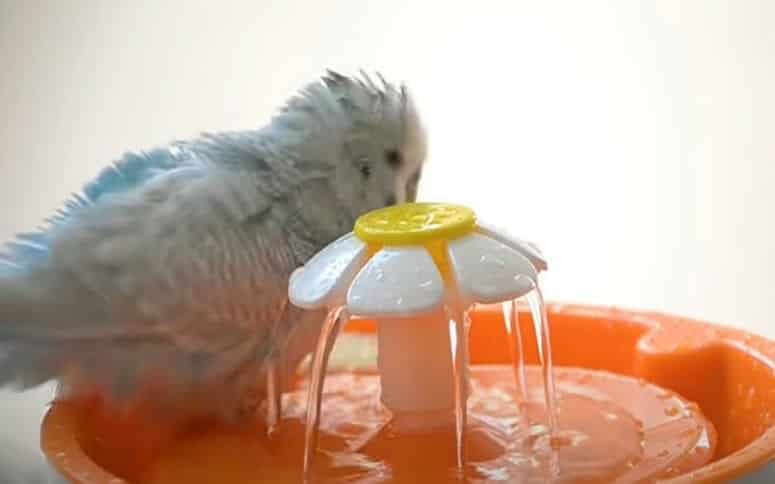
Bathing for a pregnant (or, more accurately, egg-laying) budgie is generally safe and can even be beneficial, but it’s crucial to approach it with care.
Here are some considerations:
Benefits of Bathing a Pregnant Budgie
- Hygiene: Bathing helps keep the budgie clean, which is important for overall health.
- Comfort: A gentle bath can be soothing and help a pregnant budgie feel more comfortable.
- Feather Care: It assists in feather maintenance, which is essential for temperature regulation and mobility.
Precautions and Tips
- Stress Reduction: Ensure the bathing experience is stress-free. Sudden or forced baths can cause stress, which isn’t suitable for a pregnant budgie.
- Water Temperature: Use lukewarm water, neither too hot nor too cold.
- Voluntary Bathing: It’s best if the budgie bathes herself in a shallow water dish. You can provide a shallow bowl or a unique bird bath.
- No Forced Baths: Never force a budgie to take a bath. If she doesn’t want to bathe, don’t push her.
- Avoid Drafts: Ensure the bathing area is warm and free from drafts to prevent the bird from catching a cold.
- Gentle Drying: Don’t use a blow dryer; allow her to dry naturally in a warm, draft-free area.
- Frequency: Don’t overdo it. Allow bathing opportunities regularly but not so frequently that it becomes stressful or health-adverse.
- Watch for Egg Binding: Be extra vigilant for signs of egg binding during this period. If you notice any distress, discontinue the baths and consult a veterinarian.
How Can I Understand If My Budgie Is Sick Or Pregnant?

Determining whether your budgie (parakeet) is sick or pregnant (technically, “gravid” since birds lay eggs) requires observing several signs and behaviours.
Here’s how you can differentiate between the two:
Signs of Illness in Budgies
- Changes in Behavior: Lethargy, decreased activity, or changes in vocalization can indicate illness.
- Feather Appearance: Fluffed-up feathers for long periods or bald spots are signs of distress.
- Eating Habits: Loss of appetite or changes in eating patterns are common in sick budgies.
- Droppings: Abnormal droppings (color, consistency, frequency) can indicate illness.
- Respiratory Issues: Difficulty breathing, wheezing, or discharge from the nostrils.
- Physical Changes: Swelling, lumps, or visible injuries on the body.
- Posture: Hunched posture or constantly sleeping with the head tucked under the wing.
Signs of Pregnancy (Egg-Laying) in Budgies
- Behavioural Changes: Nesting behaviour, such as shredding paper or being more territorial.
- Physical Changes: A swollen vent area and wider stance due to the developing egg.
- Nesting behaviour: Female budgies preparing for eggs will exhibit nest-making behaviours, such as carrying materials and shredding paper or bedding.
- Increased Appetite: Eating more as the body requires more nutrition for egg development.
- Weight Gain: Slight weight gain due to egg formation.
- Calcium Craving: Increased interest in cuttlebone or mineral blocks for calcium is needed for eggshell formation.
Important Considerations
- Veterinary Consultation: Visiting an avian veterinarian is crucial if you suspect illness. Self-diagnosing and treating can be harmful.
- Egg Binding: In egg-laying females, watch for signs of egg binding, a serious condition where the egg gets stuck. Symptoms include straining, lethargy, and a swollen abdomen.
- Regular Check-Ups: Regular health check-ups with a vet can help in the early detection of any health issues.
In summary, observing changes in behaviour, physical appearance, and eating habits is key to understanding your budgie’s health.
Always consult a veterinarian for accurate diagnosis and treatment.
How To Take Care Of Baby Budgies?
Caring for baby budgies involves ensuring a warm, safe environment, providing proper nutrition through hand-feeding formulas if not parent-raised, and maintaining cleanliness in the nest area. In addition, it’s crucial to monitor their health and growth closely.
Watching instructional videos on baby budgie care can be very helpful for detailed guidance.
Frequently Asked Questions Of How To Take Care Of Pregnant Budgie
How Often Should I Feed My Pregnant Budgie?
During pregnancy, it is important to feed your budgie a balanced diet. Provide fresh fruits, vegetables, and a variety of seeds. Feed small amounts multiple times daily to ensure they get the nutrients without overeating.
Should I Separate My Pregnant Budgies?
It is advisable to separate your pregnant budgies. Other birds in the flock may interfere with the nest and eggs. Provide a spacious cage for the male and female to fly freely. Female budgies can become aggressive during pregnancy, so it’s best not to disturb her during breeding.
What Do You Feed Budgies When They Lay Eggs?
Feed budgies a balanced diet of seeds, pellets, and fresh fruits and vegetables. Provide calcium-rich foods like eggshells and cuttlebone for strong eggshells. Avoid giving them avocado, chocolate, caffeine, onions, and sugary or salty foods.
Sum Up
Taking care of a pregnant budgie is crucial for their health and the health of their offspring. A balanced diet, a comfortable and spacious cage, and monitoring their well-being are essential steps.
By following these guidelines, you can create a nurturing environment for your budgie and increase the chances of a successful breeding experience.
Remember, keeping your budgie healthy and happy is the key to a vibrant and thriving avian household.
Hello Dear, I'm Poli Kolymnia, owner of many birds (including budgies).
With a deep passion for these feathered companions, I'm here to share my expertise and extensive knowledge on birds care.
My articles cover essential topics like diet, housing, care, and health, providing practical tips to help you create a happy and thriving environment for your birds.

